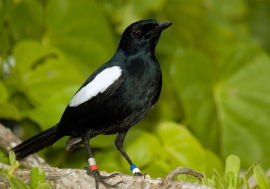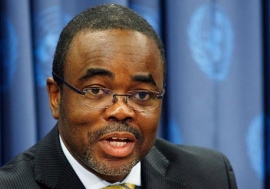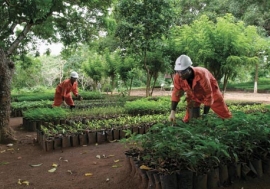‘Green economy’: empty rhetoric or pathway to future?
‘Green economy’: empty rhetoric or pathway to future?
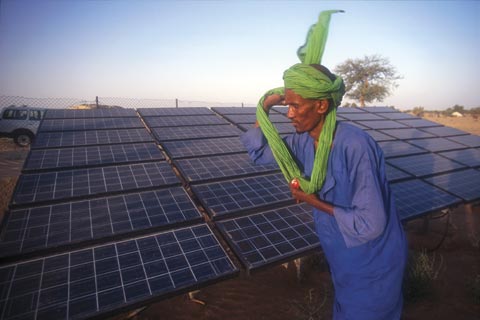 Solar panels in Mali: More African countries are moving towards use of clean energy sources.
Solar panels in Mali: More African countries are moving towards use of clean energy sources.With current trends leading the earth to disaster, world leaders and some 40,000 people converged on Rio de Janeiro, Brazil, in June in the hope of charting a path towards a better, more sustainable future for everyone that many are calling the “green economy.” Underlining the urgency, Sha Zukang, secretary-general of the UN Conference on Sustainable Development, said more than a year before the summit began: “If we continue on our current path, we will bequeath material and environmental poverty, not prosperity, to our children and grandchildren.”
However, sharp tensions and distrust between countries of the North and South and between civil society and governments — amidst general global economic uncertainty — ultimately resulted in vague agreements that left few satisfied. “It could have been worse” was a common sentiment at the conclusion of the summit, known as Rio+20 after the first Earth Summit in the same city two decades ago.
‘Half full, half empty’
The summit ended up being “a glass half-full, glass half-empty situation for Africa,” said Donald Kaberuka, president of the African Development Bank (AfDB), on the final day in Rio. “We’re making progress on thinking about the green economy, and especially the linkage between poverty alleviation and the environment.”
“This is not something we do because the international community is asking us to do it,” Mr. Kaberuka added. “We do it for Africa because we are closely linked to nature in terms of our livelihoods.”
Achim Steiner, executive director of the UN Environment Programme (UNEP), which has been a driving force in promoting the concept of a green economy, was upbeat. “World leaders and governments have today agreed that a transition to a green economy — backed by strong social provisions — offers a key pathway towards a sustainable 21st century,” he said at the conclusion.
But South Africa’s Kumi Naidoo, the executive director of Greenpeace International, strongly disagreed.
“All we have witnessed is three days of empty rhetoric and greenwash from world leaders,” he said. “Governments have failed to produce the historic deal we need to address the perfect storm of crises: of equity, ecology and economy.”
The formal outcome of the Rio+20 summit was a document, “The Future We Want,” that reaffirmed or recalled what had been agreed to years ago but offered little new. Instead, world leaders simply agreed to more talks to strengthen UN institutions, examine whether to provide developing countries with finance and technology, and establish new sustainable development goals.
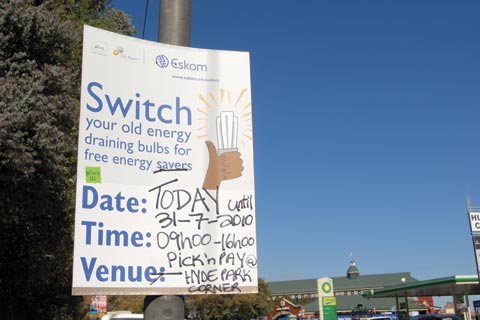 South African electricity company urges use of energy-saving lightbulbs.
South African electricity company urges use of energy-saving lightbulbs.Resources
Going into the summit, developing countries called on the industrialized nations to provide additional financing of more than $30 billion annually over 2013–17 — and $100 billion per year after that — to help them green their economies.
“We are hoping that the green economy will bear fruit when it comes to combating desertification, poverty, and protecting the environment,” said Adam Mohammed Nour of Sudan’s Ministry of Environment, Forests and Physical Development. The promise of the green economy, he said, “can only be achieved if there are sufficient resources available for that purpose. If we do not deploy sufficient effort we will never reach sustainable development goals.”
President Mwai Kibaki of Kenya agreed, arguing that an international sustainable development financing strategy would “facilitate the mobilization of financial and other resources to assist developing countries to make the transition to the green economy more effectively.”
After developed countries failed to agree to new funds — only to future talks on financing — AfDB President Kaberuka expressed disappointment. The Rio summit, he said, did not produce any concrete timetables or establish any mechanism to monitor and verify progress towards greening economies. “We are still very much in an aspirational, transitional phase.”
Some African ministers pointed to the North’s unsustainable patterns of production and consumption. “Countries must acquit themselves of their obligations and consume in a responsible manner,” said Raymond Tshibanda, foreign minister of the Democratic Republic of the Congo, referring to the fact that industrialized countries’ carbon emissions and water and resource use have a far higher impact on the planet than those of African nations.
‘A black box’
Leaders at the Rio summit agreed that the green economy “should contribute to eradicating poverty as well as sustained economic growth, enhancing social inclusion, improving human welfare and creating opportunities for employment and decent work for all, while maintaining the healthy functioning of the earth’s ecosystems.” They also agreed that it was up to individual countries to set their own policies on how to achieve this.
But beyond this general consensus, the summit did not produce a clear understanding of what the term “green economy” means. Many in Africa and in civil society groups remain suspicious that it is simply business as usual or may represent new ways to restrict trade and development.
“The green economy is a black box right now,” said Davinder Lamba, director of the Mazingira Institute, a non-governmental organization (NGO) in Nairobi, Kenya. “We don’t know what will make it tick.” More “transparency and agency” will be required to overcome the reluctance and opposition to creating green economies, Mr. Lamba added. By “agency,” he means that those at the bottom, the poor and poorest countries, must have a role in shaping what green economies are and how they will work.
The Indigenous Peoples of Africa Coordinating Committee (IPACC), an NGO network of more than 155 organizations in 22 African countries, said it was encouraged by the commitment in “The Future We Want” document to improving the livelihoods of the poor and to valuing their needs and concerns.
According to Nigel Crawhall, director of the IPACC Secretariat, many destructive projects have been justified on the basis that they increased economic growth, while ignoring their impacts on local communities and their land. Such projects now need to be “reassessed, adjusted or just cancelled, as they create poverty rather than alleviate it,” he said. “The main issue which IPACC is raising is the need for checks and balances in infrastructure and extractive industries ‘development,’ which are alienating land from indigenous peoples, destroying biodiversity and making people poorer or pushing them into urban slums.”
Some came to Rio looking for practical steps that could boost economic development and job creation. “We were hoping Rio would produce concrete solutions on sustainable development. In the East African region our priority is safeguarding nature, on which our economies depend,” said Jesca Eriyo, deputy secretary-general of the secretariat of the East African Community, a regional intergovernmental group of Burundi, Kenya, Uganda, Rwanda and Tanzania. “We expected solutions that will help our women and our economies to grow because most of our people are poor and our economies still performing below expectation,” said Eriyo.
However, she added, it is not clear what a green economy would mean for those active in nature-dependant sectors like agriculture, fisheries and tourism. If it brings innovation and industrialization, resulting in jobs in new industries, it could be an opportunity, she conceded.
Charles Mbella Moki, the mayor of Buea, a town in southwestern Cameroon, thought it would take time for the significance of the Rio summit to become clear. “It is yet to be seen in the years ahead if this get-together will have a positive impact on humanity.”

















